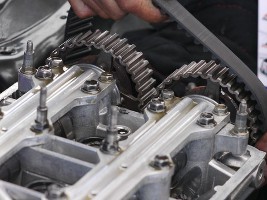 We all want to do our best to maintain our cars and do everything that we can to keep them running smoothly. And one of the parts that needs to be maintained is the timing belt. The timing belt has an extremely important part in making your engine run. The timing belt controls the camshafts in the engine. The camshaft is the shaft that opens and closes the intake and exhaust valves that let the air in that creates combustion and also vents the exhaust created by the combustion. This opening and closing of the valves has to be perfectly synchronized with the movement of the pistons. The instant at which the valves open and close affects the engine performance, fuel economy and emissions. This is why the timing belts function is so important. The timing belt is the only part that keeps the camshaft and crankshaft in sync. In some engine designs, the timing belt may also drive other engine parts like the water pump and oil pump.
We all want to do our best to maintain our cars and do everything that we can to keep them running smoothly. And one of the parts that needs to be maintained is the timing belt. The timing belt has an extremely important part in making your engine run. The timing belt controls the camshafts in the engine. The camshaft is the shaft that opens and closes the intake and exhaust valves that let the air in that creates combustion and also vents the exhaust created by the combustion. This opening and closing of the valves has to be perfectly synchronized with the movement of the pistons. The instant at which the valves open and close affects the engine performance, fuel economy and emissions. This is why the timing belts function is so important. The timing belt is the only part that keeps the camshaft and crankshaft in sync. In some engine designs, the timing belt may also drive other engine parts like the water pump and oil pump.
Timing belts are typically made out of rubber that has been reinforced with strands of fiberglass, this makes them nearly unstretchable and extremely strong. But after rotating around the crankshaft and camshaft millions of times, the strands become brittle and may begin to break. The reinforced strands crack and give way, the belt snaps, and your engine stops. This can happen without a lot of warning. Sometimes there might be a rattling noise from the front of the engine but that isn’t always the case. The best way to avoid being stranded is to check your manufacturer’s recommendation for a timing belt service and have it replaced when they recommend it. If you drive an older car or put a lot of miles on your car, it might be a good idea to have the timing belt service sooner rather than later. Some manufacturers may also recommend replacing other parts, such as the water pump, at the same time as the timing belt because the additional cost to replace the water pump is small compared to the cost of having to access the timing belt twice.
If you would like more information or a coupon for a timing belt service, look at our When to Replace Your Timing Belt blog. For all of your Denver Auto Repair needs, trust Express Car Care. Call (303) 691-2760 or stop by our shop today.

Leave a Reply
You must be logged in to post a comment.